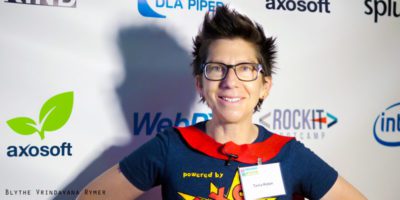Nadira Hussain is One Oracle Programme Manager at oneSource, the shared service created by the London Boroughs of Newham and Havering. With both private sector and extensive public sector experience, she has worked in numerous roles both at the operational and strategic level within the ICT [information and communications technology] service and business. She started her career as a microbiologist and in 1994 she joined the London Borough of Redbridge as a Policy Development and Research Officer in social care, and she has been in the local government sector ever since.

Nadira became President of Socitm (the Society of Information Technology Management) on 23rd April 2015 at the Socitm Spring Conference in London, where she took over the role from outgoing President Nick Roberts. Socitm is an IT professional body for people involved in the leadership and management of IT and digitally enabled services delivered for public benefit.
Becoming President of Socitm: What it means to me
I think it’s an absolute fabulous opportunity and I’m already overwhelmed with the support, the input, the positive response to: 1) Being a woman in that prestigious role; 2) The key themes that I’d set out to achieve in my year of term; and to work with the Socitm key stakeholders to ensure that those themes are proactively managed.
Back to it being a fabulous opportunity, it truly is, so aside from the personal development and the networking opportunities, it is a privilege to be working with professional, renowned colleagues in the sector. Further still is the fact that I’m able to be in a position to promote the themes that are close to my heart, the things that I want to champion and have an interest in.
It is also the opportunity to become a more diverse and inclusive society and address some of that gender imbalance that we’re hearing more of. We’re hearing more feedback suggesting that we need to do more about having women leaders in ICT and championing the cause. It ticks all the boxes. It’s an absolutely brilliant opportunity.
Career change – from microbiology to ICT
I did about three and a half years in the private sector in the food industry. It absolutely happened as a matter of chance with no planning whatsoever, as you do as a young graduate. You think that you’re going to come out and follow your profession, but that too in itself became a little bit repetitive and mundane for me.
I didn’t see any progressive change or my hard work giving rise to any kind of substantial output – research and development is a long drawn out process. I wanted to make a difference. I wanted to see some immediate value add for my contribution, which is why I joined local government in the first place.
Not a hands-on ‘technology person’ by any stretch of the imagination
I left my research and development background to work in a policy development environment and that was more in the front line social care arena. I then found that I was developing my business analysis skills – I went into corporate ICT via that route, so I’m not by any stretch of the imagination a qualified ‘technology person’.
I have used the transferable skills developed from a scientific background, the R&D approach and knowledge of how local government operates to apply myself in the ICT Service. I have spent a lot of time building relationship with the business, understanding customer needs and ensuring that the ICT solutions that are provided are therefore fit-for-purpose and appropriate.
I want to promote the use of softer skills such as business analysis, programme and project management and relationship management when I am talking to other women, and especially introducing newcomers to ICT. It’s not purely hands-on technology. There are other means of accessing ICT and there are so many more opportunities where you’re making wholesale difference to the lives of others and the communities that we serve.
So it’s about local public service provision and ensuring that we are adding value through listening to the communities that we serve, so it’s a convoluted way of saying ‘how’ and ‘why’?
Why local government a great sector to work in
That once again is because from my perspective there is such a diverse range of services that we provide in local government and my belief is, having worked in the public sector for such a long time – over 20 years now, if you work in local government I think you could probably work anywhere, just because of the scale, complexity and challenges that we are having to deal with.
So why local government, why public services? Because you have the opportunity to return on the investment that’s made in you as an individual. You have the opportunity to make a difference, to change lives and it’s about presenting that compelling argument that through the delivery of good, effective, sound ICT you are touching every service.
The public sector is facing unprecedented challenges to do more with less in the current economic climate: How shared service solutions are helping to achieve cost savings
We’ve seen numerous models of shared services established over between the last five and ten years. It’s about understanding firstly how these shared services are established, so there are numerous business models. (In fact I was talking to my Socitm colleagues yesterday about trying to prepare a repository or a portfolio of the way in which shared services can be established.)
Secondly, my current experience is that we’ve got to not only establish the shared service, but we’ve got to embed it to a place of maturity, whereby we can demonstrate “what’s in it for me?” so it’s a case of: Are there cost benefits to be realised? How?
If there are established shared services, could we tempt other users, other local government or public sector organisations to join established shared services if that is a cost effective model for them? It’s about trying to highlight the challenges and lessons learnt, and give people a heads up and insight into how shared services can be established so we’re not reinventing the wheel.
It is about case studies and lessons learnt, and demonstrable evidence that there are economies of scale and benefits to be realised through sharing services and I think that seems to be the way in which we are getting advice and guidance from the Government. So it’s almost a case of pre-empting a more collaborative approach to working before it becomes mandated.
Priorities during my presidency
Aside from continuing the excellent work that Socitm is doing, and without a doubt we’ve heard the voice of public sector ICT professionals growing, developing and we are hugely concerned as a society that we can advance the thinking and deliver responses to the challenges that we’re facing.
Some of my work will hopefully continue with the access to member services – we’ve introduced a corporate membership. So how are we going to add value to our members? I’m working with my Socitm colleagues to look at that. I’m absolutely keen to share the shared services experience that we’re already discussed, so can we develop some case studies, can we develop repositories that people can access instead of doing this for themselves?
Thirdly, it’s a case of the promotion of women in IT, so improving their visibility, using them as role models, increasing their attendance at conferences and debates, and giving them the opportunity to network and promote themselves in their careers. Also to use them as the role models that the younger generation needs to say that there are real career options in progressing with IT – especially within local public services where you are making such a significant difference to people’s lives.
How Womanthology readers can get involved
So I’m in the process of establishing a collaborative space via a knowledge hub. We are going to call it Socitm ‘Women in IT’. It won’t just be restricted to Socitm members. The idea is to cascade and get as much involvement from women who want to be involved (and men of course), contributing, lobbying, sharing experiences, lessons learnt – best practice. Why would we continue to reinvent initiatives? It’s not the way I want to do this. I want to make sure I tap into existing sources of information, guidelines and best practice.
We’ve also had interest from the Major Cities of Europe (MCE) partners and contacts and the international community (LOLA) – Australia, New Zealand, America – I’ve had interest from far and wide from people who want to be involved in the group and understand what we’re trying to achieve. I’ve had emails directly from contacts: “Please keep us updated and informed. We want to be a part of this.”
I have prepared the terms of reference, we’ve secured the space and the knowledge hub, and will formally launch shortly and we will then have an opportunity for anybody who has an interest to join.
Tangible deliverables
For me, the nub will be tangible deliverables. It’s great talking about these things, but you’ve got to enthuse people when they are contributing to the knowledge hub space as they post information or whatever it may be. It’s easy to get lost in the madness and momentum of the moment, but it is difficult to keep people committed with day jobs, with what’s going on outside of work.
For me, it’s a critical point, but I’m looking forward to the challenge.
https://twitter.com/socitmpresident





